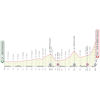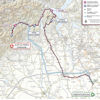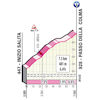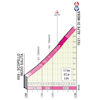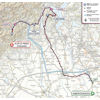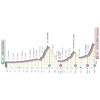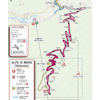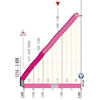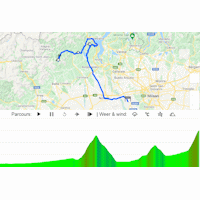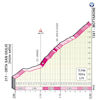The stage has been rerouted to bypass the Mottarone climb, where a cable car crash took the lives of fourteen people last Sunday.
The riders click into their pedals in Abbiategrasso, which is a popular Giro hub with three stage starts in the last four Giro editions. Last year the race went to Asti (Josef Cerny win) and in 2018 the riders traveled from Abbiategrasso to Prato Nevoso (Max Schachmann win).
The riders pedal towards Novara, where Tim Merlier recently won stage 2, and continue on the Po Plains towards the Alps. After brushing Lago d’Orta the route begins to point gently uphill in Orta San Giulio. The climb to Gignese is mostly false flat, although there is 1 kilometer at 7% just after Armeno.
The riders descend to the Lago Maggiore before returning to the Lago d’Orta. The second climb also begins on the lakeshore, but this time on the western side instead of the eastern. The Passo della Colma is 7.5 kilometres long and averages at 6.4%.
After the descent the route follows the Sesia upstream to Scopello. Which is where the unprecedented finish climb kicks in. The Alpe di Mera is 9.7 kilometres long and the average gradient sits at 9%. It’s a hard test with the steepest part in the second half. The last 3 kilometres rise at an unforgiving 10.5% to the line.
The second intermediate sprint – just before the base of the finish climb – comes with 3, 2 and 1 seconds, while time bonuses of 10, 6 and 4 seconds are awarded to the first three riders on the line.
Another interesting read: results report 19th stage 2021 Giro.
Giro d’Italia 2021 stage 19: routes, profiles, more
Click on the images to zoom
Underneath you’ll read about the original route:
Abbiategrasso hosted three stage starts in the last four Giro editions. Last year the race went to Asti (Josef Cerny win) and in 2018 the riders traveled from Abbiategrasso to Prato Nevoso (Max Schachmann win).
This time the riders head toward the west at first. After Novara they change directions and go northward, in the direction of the Alps. Climbing begins in Orta San Giulio, with some 100 kilometres remaining.
The Mottarone towers above Lago d’Orta and the climb to the summit is 15.4 kilometres long and averages 6.7%. It is an irregular toil with the steepest section – 3 kilometres at 10.1% – beginning after 5.5 kilometres of climbing.
A long descent takes the riders down to the Lago Maggiore before they return to the Lago d’Orta. The second climb also begins on the lakeshore, although this time on the western side instead of the eastern. The Passo della Colma is 7.5 kilometres long and averages at 6.4%.
After the descent the route follows the Sesia upstream to Scopello. Which is where the unprecedented finish climb kicks in. The Alpe di Mera is 9.7 kilometres long and the average gradient sits at 9%. It’s a hard test with the steepest part in the second half. The last 3 kilometres rise at an unforgiving 10.5% to the line.
Giro d’Italia 2021 stage 19: routes, profiles, more
Click on the images to zoom
